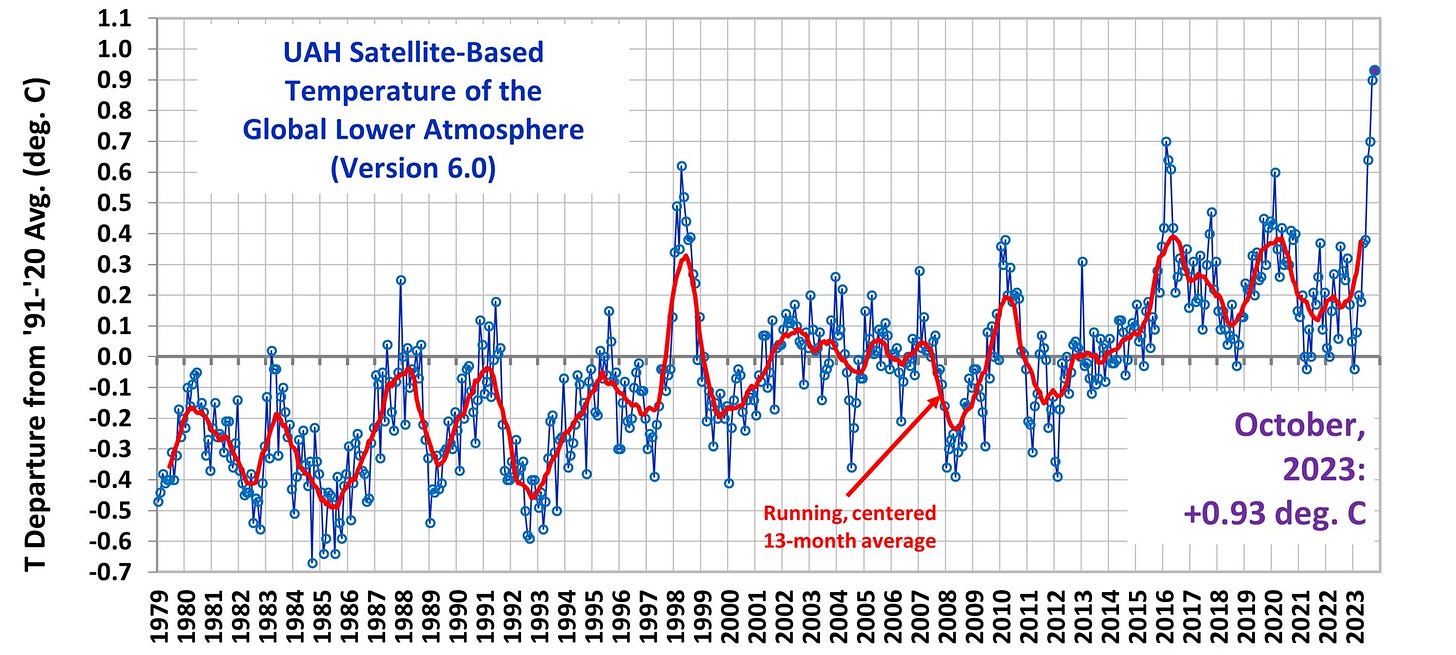October 2023 lower tropospheric mean temperature anomaly is just slightly above September, and a new record:
If, as I suggested might happen, warming now starts to plateau, without a subsequent large drop characteristic of previous warming spikes due to El Ninos, then something very extraordinary is happening - and it’s not CO2, or methane emitted by humans, or any weird, unexplained ‘tipping point’ feedback caused by those emissions of greenhouse gases. The warming is also too soon and too strong to be due to the developing El Nino. It’s not man-made ‘climate change’ because there has been no sudden acceleration of anthropogenic greenhouse gas emissions, only a sudden acceleration in warming. What on earth could be causing this?
Fact: Hunga Tonga erupted in the southern hemisphere in January 2022.
Fact: The volcano spewed vast amounts of cooling aerosols plus a vast and unprecedented (in the satellite record) amount of sea water deep into the stratosphere.
Fact: water vapour is a powerful greenhouse gas. In the troposphere, it produces sharp spikes in warming during El Nino events.
Fact: the cooling aerosols from Hunga Tonga have largely disappeared from the stratosphere as of summer 2023. The water vapour has not; it is far more persistent and may remain in the stratosphere for the next 2 to 3 years.
Fact: When Hunga Tonga erupted, the world was experiencing a ‘triple dip’ La Nina, which would have tended to cool the planet. In 2023, that ended and an El Nino is currently ongoing in the Central Pacific. So, the La Nina cooling in 2022 and the moderate El Nino contribution to warming in 2023 would have worked in sympathy with the radiative cooling and warming effects of Hunga Tonga, exacerbating initial cooling and enhancing subsequent warming.
Bearing in mind these facts, plus current research regarding the atmospheric radiative effects of water vapour in the stratosphere (which I shall explore in greater detail in a subsequent post), it seems highly likely that the current persistent spike in global warming, which started this summer, is due in large measure to the eruption of Hunga Tonga. Other effects may play their part - there is much talk of the sudden disappearance of aerosols from ship exhausts due to the banning of sulphur additives from marine diesel fuel - but I think the major influence is the Hunga Tonga eruption. Deniers gonna deny however, because they have a political agenda to press home, but data and science strongly suggests they will be proved wrong.
Just one note of caution: northern latitudes are warming even faster than southern latitudes at present, which is perhaps not quite what we would have expected considering that the majority of the water vapour from Hunga Tonga was injected into the southern hemisphere stratospheric regions. This requires an explanation.
Update 4th November 2023
To confirm that El Nino is not currently contributing significantly to global mean surface temperature and probably will not bump up temperatures as high as the super El Ninos of 1997/98 and 2015/16:
"This year’s El Niño is still developing, but researchers are looking to the recent past for clues as to how it is shaping up.
By October 1997 and 2015, large areas of the central and eastern Pacific had sea levels more than 7 inches (18 centimeters) higher than normal. This year, sea levels are about 2 or 3 inches (5 to 8 centimeters) higher than average and over a smaller area compared to the 1997 and 2015 events. Both of the past El Niños reached peak strength in late November or early December, so this year’s event may still intensify."
“Every El Niño is a little bit different,” said Josh Willis, Sentinel-6 Michael Freilich project scientist at NASA’s Jet Propulsion Laboratory in Southern California. “This one seems modest compared to the big events, but it could still give us a wet winter here in the Southwest U.S. if conditions are right.”
https://wattsupwiththat.com/2023/11/03/new-ocean-satellite-monitors-how-el-nino-is-shaping-up/





The UN will soon have us all counting warm baths taken and kettles boiled.
It's been raining constantly here in the Northeast US this year. Constantly! It's reminding me more of Portland Oregon.
The moisture had to come from somewhere, perhaps that huge volcano is to blame. But let's face it, after 40+ years of trying to nail down weather forecast models that work, we've failed. There are simply too many variables and unknowns. We simply must adapt to what is.
Minimizing human pollution of all kinds is important for the health of humanity. In the 70's the US was covered in trash and vehicles were getting 10mpg... So improvements to help clean up our neighborhoods are good with careful measure. But to think we can direct the trajectory of global climate sure seems like nonsense.